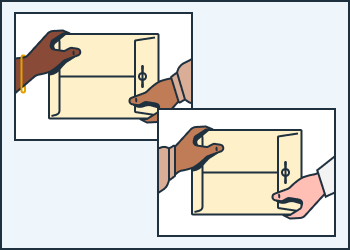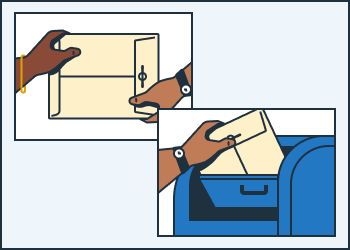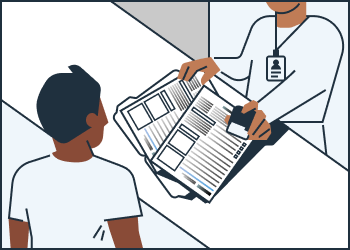Serve your lawsuit by substituted service
If your server has made several attempts to deliver the papers to the defendant, but they're never at home or work, your server may be able to do substituted service. Substituted service means giving the papers to another adult who is there and then mailing a copy of the papers. This only works if someone else is there who can take the papers.
How to serve by substituted service
-
Your server must try multiple times to deliver the papers
Generally, the server must try to deliver the papers at least 3 times. They need to try on different days of the week and at different times of the day. There should be times when the defendant is likely to be at home or work.
-
The server hands the papers to someone else on the last try

After multiple tries, if someone else, but not the defendant is there, your server may be able to hand that person the papers instead. Your server can hand the papers to:
- Someone 18 or older who is at the home and lives with the defendant (like their spouse or roommate)
- Someone 18 or older who seems in charge where the defendant works (like a manager)
- Someone 18 or older who seems in charge where the defendant usually gets their mail (but not a United States Postal Service (USPS) post office box).
Your server must tell the person they’re giving the papers to that the papers are legal documents and who the papers are for.
Your server must also write down the name of the person they gave the court papers to. If the person will not give their name, the server must write down a detailed physical description.
-
The server mails a copy of the forms

Next, your server must also mail a copy of the papers to the defendant at the address where they left the forms. They need to write down the date they mailed the forms and the city and state they mailed them from.
-
Server writes and signs a Declaration of Due Diligence
Your server must write a Declaration of Due Diligence. This explains every time they tried to serve the papers. It must include the dates they went to the house or work, times of day, and what the result was (for example, “No one answered the door” or “not in the office”).
Your server has to sign this declaration under penalty of perjury. There is no form for this, but your server can use a Declaration (form MC-030).
-
Have your server fill out the Proof of Service form

Use the Proof of Service of Summons (form POS-010).
You can fill in the top part of the form with the case and court information but the server has to fill out how, when, and where they served the papers. They must attach a copy of the Declaration of Due Diligence to the Proof of Service. Then, your server should either give you back the Proof of Service form with the Declaration of Due Diligence, or they can do step 6 for you.
-
Copy and file the Proof of Service form

- Make 1 copy of your filled-out Proof of Service form and Declaration of Due Diligence.
- File the original and copy. The court will keep the original and return the copy to you.
- Keep the copy for your records.
What's next?
After you serve your forms, the other side has time to respond. Your next steps depend on what they do. They might not respond by the deadline, they may reach out to try to reach an agreement, or they might file a response.

